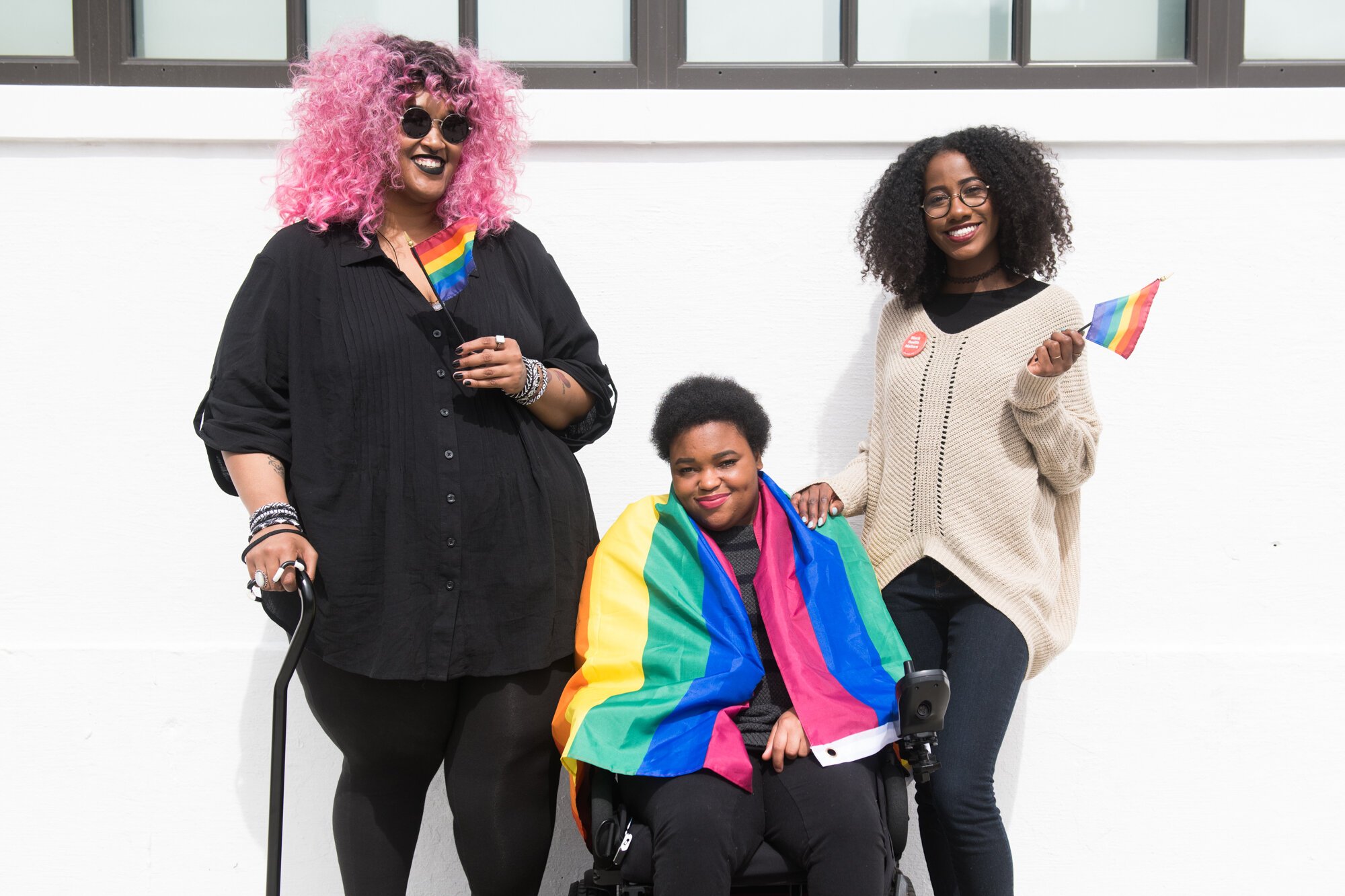Pride Isn't About Parades or Rainbows.
By Erica Freedman, Operations Manager at Beloved Community
Photo from Disabled & Here
We enter Pride month in 2020 amidst another painful and dark time in our country's history. Too many black people have been added to the murder count at the hands of police in the past few weeks including, but sadly not limited to, Breonna Taylor, Ahmaud Arbery, George Floyd, Nina Pop and Tony McDade. Tony McDade and Nina Pop were members of our community. A trans man from Tallahassee, Florida and a trans woman from Sikeston, Missouri. According to the Human Rights Campaign, “Tony McDade’s death is believed to be the 12th violent death of a transgender or gender non-conforming person this year in the U.S.” There are countless misconceptions about the LGBTQIA+ community, specifically as it relates to diversity, access, safety and equity. At Beloved Community, we hold naming these misconceptions as a top priority. Here are just a few things to take note of:
We aren’t all safe. The Human Rights Campaign tracked at least 26 deaths of transgender and gender nonconforming people in 2018. The majority of these individuals being black, transgender women. In 2019, another 26 cases were reported. And, as stated above, 2020 has already seen twelve reported deaths in under five months. To be clear, these deaths are violent and unquestionably fatal.
Fatal violence disproportionately affects transgender women of color.
Painfully, these statistics barely scratch the surface of grossly skewed unreported, underreported, and misreported cases throughout the United States. As a fellow white, queer person, I am asking you, white queer people, to take a moment to consider the privileges you hold in 2020 that other folx in our community have not yet been afforded. Progress is happening, but it is not happening at the same rate for everyone. Which brings me to my next point.
We aren’t all white, gay men. As the commercialization of Pride runs rampant, and corporations replace homegrown, local floats that once decorated our streets, the face of Pride becomes further whitewashed. It shouldn’t come as a shock that black and brown folx feel left out and marginalized during Pride month and beyond, and have a long history of celebrating their own Black Prides. Two years ago the city of Philadelphia released an updated Pride flag that included a black and brown stripe to increase visibility of the POC people in our community. This sparked outrage and protests from the gay, white, male elite. A group that, in recent elections, have seen an increase in alt-right, white nationalist and white supremacist ideologies. In fact, many protestors insisted a white stripe be added for fairness. Much like the #alllivesmatter movement, this group has missed the point.
The undeniable truth here is that our community does not practice Kimberlé Crenshaw’s theory of intersectionality. In fact, a Vice article listed in the resources below explores “safe” spaces in gay hubs like NYC and San Francisco that are undeniably unsafe and extremely racist. If you are fighting for LGBTQIA+ rights, and falling short when it comes to race, gender, visibility, socio-economic status, homeless queer youth, or the continued escalating violence against black transgender people, you are part of the problem. Intersectionality needs to become a cornerstone of our identities as queer people to celebrate our differences because...
We aren’t all the same. Don’t forget, the first pride was a riot that lasted six days in 1969 and was fought by black and latinx, trans women. Marsha P. Johnson, Sylvia Rivera, Stormé DeLarverie, and Miss Major as well as countless others put their bodies and lives on the line for us to openly live ours.
As we celebrate queerness and pride month we must uphold our black and brown trans community as the foundation and direct reason for our progress.
Popular gay culture has reinforced the stereotypes of whiteness and of young queers draped in glowing lights, turned up at bars and dance clubs, on drugs and/or down for anything. Let’s be clear. Like any marginalized group, that of the Queer community is vast, diverse and complex. Not all people in the queer community like to party. In fact, there are many people in the queer community that are addicts in recovery, single parents, no longer in their twenties or simply uninterested in these scenes. These stereotypes reinforce capitalist consumerism that further divides us. You don’t have to thrive in the circuit party scene to belong to the LGBTQIA+ community, and I invite you not to let a vodka brand convince you otherwise.
This season, take a moment. Think deeply about privilege. Much like the rainbow, I ask you to uphold our entire spectrum. Celebrate consciously, fiercely, and passionately. Celebrate our history and our differences by first recognizing them. From our Beloved Community to yours, Happy Pride.
Resources:

